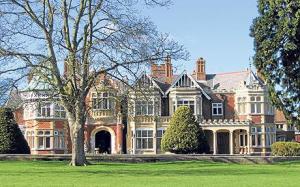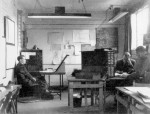In 1938, a group now known as “Captain Ridley’s Shooting Party” visited Bletchley Park. They were not just aristocratic hunters and they were not there to hunt. Captain Ridley and his companions were scoping out the place as a base for MI6 and GC&CS (Government Code and Cypher School). Bletchley was destined to become the nation’s center for hacking.
From the moment I heard about Bletchley Park and the Codebreakers, my imagination put me there as an important part of the war cog. There is something oddly romantic about a place crammed full of mathematicians, military personnel, WRENS, WAAFs, ATS, and clerks of all types and genders. I suppose my life seems a bit boring and my tendency to daydreaming puts me at risk of wishing I had made more of a difference in the world. A visit to Bletchley is a reminder of one’s inadequacies. When I sit down with the New York Times crossword, I begin knowing I most likely will not finish it on my own. I can go to a dictionary or if I’m frustrated enough, I can Google it. Someone has solved any clue I encounter and I can piggyback on his success. The amazing part of problem solving today, whether it be a crossword or a leak in the kitchen faucet, is that someone has taken the time to share the solution. There is no academic exclusivity on the Internet. Most people seem eager to share what they have learned, even if it isn’t accurate. So I can finish the crossword and leave the paper open with my effortless accomplishment on display.
But the code breakers worked to end a war. Their reasons for joining the GC&CS were varied. Some were summoned, intellectual beings who wanted nothing more than to stay secluded in their college rooms. Some volunteered and undertook a series of logic and puzzle exams. Many others worked as clerks, dispatchers, typists, and radio listeners. They knew nothing about what happened in any of the other huts or how their work related to the code breaking. They understood, though, that somehow even menial work contributed to winning the war. Ships won’t sink if I don’t finish the crossword.
There was nothing romantic about cold winters, long hours, self-induced stress to the point of nervous exhaustion or, for vulnerable individuals, complete breakdowns. They worked with incomplete data, attempting to sort through information that would later take days once they had a rudimentary computer. Suddenly mathematical geniuses worked beyond the hypothetical. Each time they failed to find the solution, they knew lives had been lost.
The Polish had the Enigma as early as 1932 and gave their findings to the British in 1939 as war broke out. With this information, the people at Bletchley soon broke “The Green” (the German Army’s Administrative codes) and “The Red” (Luftwaffe). I know I will never understand the effort it took to break codes, especially when they dealt with Enigma combinations in the “159 million million million” range. The Turing/Welchman electrical data machine (The Bombe) and the world’s first programmable computer called COLOSSUS were developed to help break the “unbreakable” codes. But even these machines and the superior intelligence of the mathematicians and logicians needed more information. Some of their biggest breakthroughs came after a human error, because the codes were unbreakable if looked at in a purely mathematical way. My favorite story from Bletchley is when someone thought about the German soldier who had to get up every morning and choose the Enigma settings for each day. The Bletchley codebreaker realized the soldier might be tired every morning and just change the last numbers of the setting. He was right. They were able to break more codes because of one man who was too tired to change all of the settings. I like this story because it shows that all sorts of people are needed to solve an unsolvable problem. Maybe a social historian like me can make a difference.
Not only did those Bletchley residents often work themselves to an inevitable breakdown, they had to sign the Official Secrets Act that held their silence until around 2000 when the secrets of Bletchley began to penetrate the public conversation. Touring the park on a fine spring day reveals nothing about the conditions they faced. I stepped off the train into the empty Bletchley station and took the walk to the park. On my way, I tried to imagine the congested trek to Bletchley Park at all hours as the shifts changed. How many trains arrived daily, crammed with Bletchley workers, who because of the Official Secrets Act could not discuss their work with anyone or with one another? Problems, so often mulled over with commuting seatmates, were forbidden. Mothers pretended to knit balaclavas for the troops, when in fact they solved cryptic puzzles. (Bletchley Circle attempts to show the full impact of those who signed the Official Secrets documents). The need to keep Bletchley secret from the enemy and the general public required the fabrication of a spy named Boniface and the creation of an imaginary network of spies.
It’s too bad that the government didn’t lift the secrecy sooner, because so many ordinary citizens died before they could tell of the incredible things they did for the war effort. Children wondered about fathers who seemingly did nothing during the war, thinking they avoided service for some selfish reason. Their mothers didn’t have factory jobs or work in canteens. Where were their parents when the war needed them? They were at Bletchley or somewhere assaulting their bodies and minds in an intellectual war that made their efforts just as essential as the soldier who protected his buddy. Yet they worked in secrecy and isolation and had to pretend they did routine clerical work. I wish we had those ordinary stories from those people who went to their graves, so patriotic that fifty years later they did not break their Official Secrets contract. As a historian, I find it such an utter waste, especially coming from America, where every obituary recounts one of the most important events in someone’s life – their war experience. How did it weigh down those who must guard their every comment and cover up something unexplainable in a moment of abandoned regard to secrecy?
The restoration of Bletchley Park isn’t just another World War II preservation story. The story of breaking codes resonates with younger generations who relate to hackers and gaining classified information to warn the public of wrongdoing. It talks to those who admire the challenge of delving into secrets or to those gamers who must solve the puzzle to gain access to the next level of their game. However one feels about hacking and whether it is an activity to encourage or punish, the people at Bletchley were the ultimate hackers. They spent their war years breaking passwords and gaining information to win a war. I visited Bletchley one week before my host’s son went there on a field trip for school. When he came back, the middle-aged woman from America and the fourteen year old boy from Oxford talked about Bletchley. And when I sat with the ninety year old woman from Woodstock in the cafe, we talked about Bletchley and the Official Secrets Act. The restoration of Bletchley opens up conversations and in its way, the story of Bletchley bridges the generation gap.



Interesting blog Kathy scenes we celebrated the 70 year anniversary of D day yesterday. The news reports both nationally and local were very touching when hearing the stories of survivors and the impact that landing had on the war… Reading and commenting on your blogs has brought out a new interest in history plus because of my lack of experience on the tech equipment I’m constantly looking up spelling of words. Keep up the good work…
Fascinating read Kathy. I must admit that I knew very little about Bletchley – not even the name – only the code breaking that went on during the war. Extremely interesting. Makes me even more appreciative of the variety of ways that generation showed discipline, honor and courage protecting freedom for all of us.